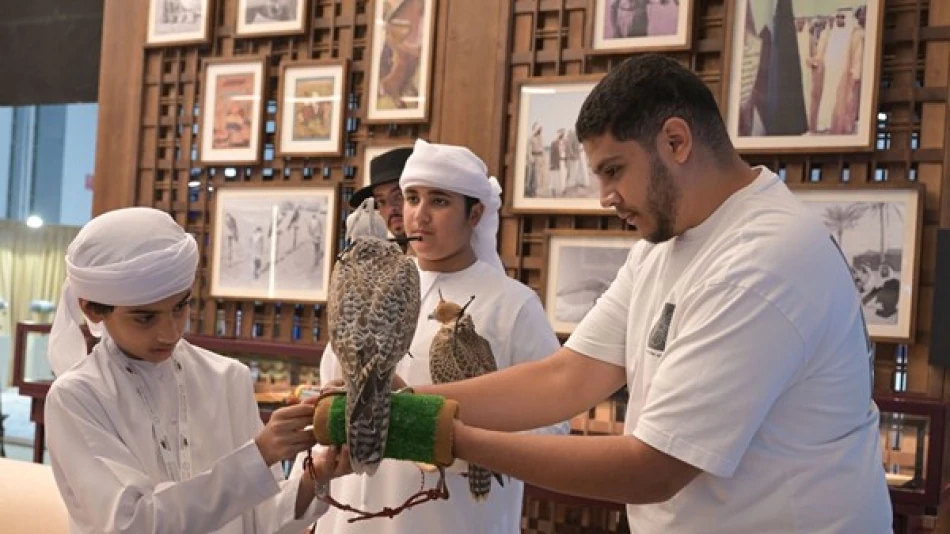
Thrilling Displays and Events Await Visitors at Abu Dhabi International Hunting and Equestrian Exhibition
Abu Dhabi's Hunting and Equestrian Show Proves Cultural Heritage Can Drive Modern Economic Growth
The Abu Dhabi International Hunting and Equestrian Exhibition 2025 has opened to thousands of visitors, showcasing how traditional Emirati culture is being transformed into a thriving commercial sector. With over 2,000 participating companies and 15 specialized sectors, the event demonstrates the UAE's strategy of monetizing cultural authenticity while preserving heritage for future generations.
A Strategic Blend of Tradition and Commerce
Under the patronage of Sheikh Hamdan bin Zayed Al Nahyan, the Governor's Representative in Al Dhafra Region and President of the Emirates Falconers' Club, this year's exhibition represents more than cultural celebration—it's a calculated economic move. The event brings together 2,068 exhibiting companies and brands worldwide, including 552 national companies, creating a marketplace where traditional practices meet modern business opportunities.
The exhibition's 15 specialized sectors cover everything from cutting-edge hunting equipment to falconry tools, equestrian gear, and outdoor adventure supplies. This comprehensive approach reflects the UAE's broader economic diversification strategy, transforming niche cultural interests into substantial revenue streams.
The Falcon Economy Takes Flight
The ongoing falcon auctions represent a particularly lucrative aspect of the exhibition, offering rare, high-quality birds from elite local and international farms. Participants can bid both in-person and through digital platforms—a modernization that expands market reach beyond traditional boundaries.
This digital integration mirrors broader trends seen in luxury markets globally, where traditional auction houses like Sotheby's and Christie's have successfully moved high-value transactions online. The falcon trade, worth millions annually in the Gulf region, benefits from this technological adoption while maintaining its cultural significance.
Knowledge Transfer as Economic Driver
The exhibition's Knowledge Center hosts educational sessions that bridge traditional practices with modern sustainability concerns. Topics range from the relationship between technology and sustainable development in wildlife protection to responsible hunting practices—addressing growing global concerns about environmental conservation.
These sessions featuring industry experts serve a dual purpose: preserving traditional knowledge while adapting practices to meet contemporary environmental standards. This approach positions the UAE as a responsible leader in heritage tourism and sustainable cultural practices.
Cultural Tourism's Growing Market Potential
The Arena showcases live demonstrations of horsemanship, dog agility, and traditional hunting arts, creating immersive experiences that appeal to international tourists. This entertainment aspect transforms cultural practices into tourism products, similar to successful models in countries like Mongolia with eagle hunting or Spain with equestrian traditions.
The family-friendly programming extending through September 7th indicates a strategic focus on developing domestic cultural appreciation alongside international tourism revenue. This dual-market approach has proven successful in other Gulf states, where cultural festivals generate significant economic impact while strengthening national identity.
Regional Leadership in Heritage Commercialization
The exhibition positions Abu Dhabi as the region's premier destination for hunting and equestrian enthusiasts, competing with established international events in Europe and North America. By combining authenticity with innovation, the UAE creates a unique value proposition that leverages its geographic position as a bridge between East and West.
This strategy aligns with the UAE's Vision 2071, which emphasizes cultural preservation as an economic asset. The success of such events demonstrates how traditional practices can be systematically developed into sustainable economic sectors without losing their cultural essence.
The exhibition continues until September 7th, offering a comprehensive program of competitions, family activities, product launches, and cultural performances that showcase the commercial viability of heritage-based industries in the modern economy.
Most Viewed News

 Layla Al Mansoori
Layla Al Mansoori






